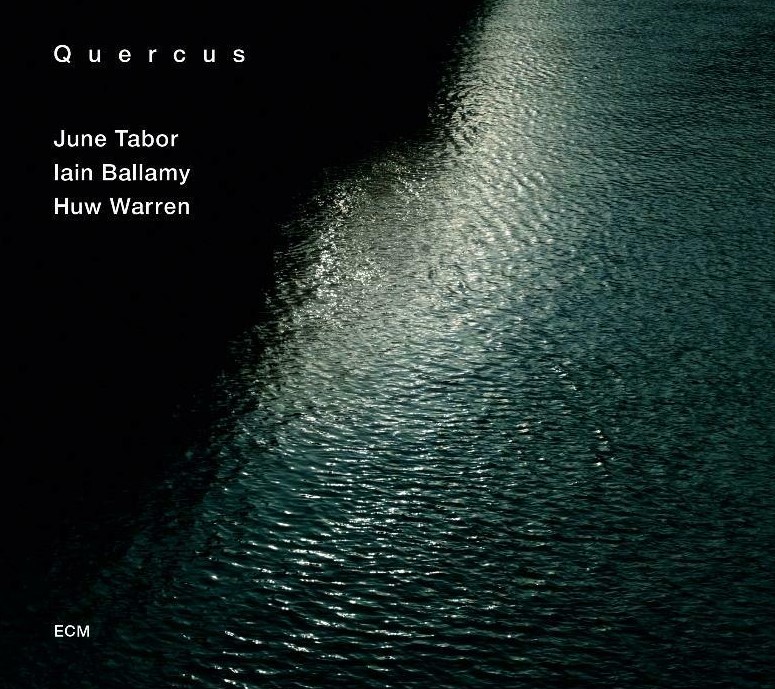
Quercus (ECM)
Quercus
Released March 15, 2013
The Guardian 10 Best Jazz Albums of 2013
YouTube:
https://music.youtube.com/playlist?list=OLAK5uy_nA1yJL-AdzyGXoVEEn2zUUqu-kdivbWhc
Spotify:
About:
The trio Quercus delivers profound and moving interpretations of traditional and non-traditional song on its debut album, approaching the heart of the material by unorthodox routes. In this unique group, the dark voice of the great English folksinger June Tabor is framed and supported by the quietly adventurous arrangements and subtle improvisations of Iain Ballamy and Huw Warren. Warren has worked with Tabor for 25 years already and made important contributions to her albums. “His piano”, The Guardian has observed, “has teased out the deeper autumnal colours in Tabor’s range.” The nature of their association in Quercus is different, however. This is very much a collaborative band. Together and from different vantage points singer, saxophonist and pianist explore the emotional core of the songs. Most importantly, the songs and the words are respected as instrumental skills and melodic imaginations are harnessed to illuminate them.
The first part of “Come Away Death”, for instance, based upon Shakespeare’s text from Twelfth Night, finds Ballamy’s tenor sax chanting with the vocal line. “One of the things I’m trying to do in Quercus”, Ballamy says, “is to make one sound with June’s voice. It’s a matter of tone and precise control of volume. When you have music in tune and deeply blended at the source like that it can be very powerful in the moment. As a goal, that’s much more interesting to me than the execution of a clever solo.” The second half of the piece is Ballamy’s instrumental setting of the text, saxophone and piano dancing to an iambic beat.
In common with most of Tabor’s work, material selected does not shy from life’s big topics: death, war and betrayal are themes here, but also love, fidelity and reunion. The album opens tenderly with Robert Burns’ “Lassie Lie Near Me”, but before long the transitory nature of happiness is captured in A.E. Housman’s World War I poem “The Lads In Their Hundreds” set to George Butterworth’s music in an arrangement by Ballamy. Warren’s solo piece “Teares”, channeling Dowland, is an appropriate response…
The chamber music precision of Quercus’ performance belies the fact that it was recorded live at the end of a British tour in 2006, at the Anvil in Basingstoke. (As Ballamy recalls, “the piano was excellent, the acoustics in the hall were good, and nobody coughed.”) The tapes were mixed in Oslo in 2012 by Manfred Eicher and Jan Erik Kongshaug, together with Ballamy and Warren.
Track Listing:
1. Lassie Lie Near Me (Traditional, Robert Burns) 05:09
2. Come Away Death (Iain Ballamy, Traditional, William Shakespeare) 06:31
3. As I Roved Out (Traditional) 05:56
4. The Lads In Their Hundreds (George Butterworth, A. E. Housman) 05:35
5. Teares (Huw Warren) 03:54
6. Near But Far Away (Iain Ballamy, June Tabor, Traditional) 07:27
7. Brigg Fair (Traditional) 02:25
8. Who Wants The Evening Rose (Yosef Hadar, Les Barker) 04:41
9. This Is Always (Harry Warren, Mack Gordon) 04:35
10. A Tale From History (The Shooting) (David Ballantine) 04:31
11. All I Ask Of You (Gregory Norbet, Les Barker) 08:03
Personnel:
June Tabor: voice
Iain Ballamy: tenor and soprano saxophone
Huw Warren: piano
Recorded live March 2006, Anvil, Basingstoke, by Paul Sparrow
Mixing: Jan Erik Kongshaug and Manfred Eicher
Editing: Mike Mower
Photography: Jan Kricke
Design: Sascha Kleis
Produced by Manfred Eicher
Review:
The folk singer June Tabor has been a marvel of English music since the 1960s, and her long-term pianist Huw Warren and saxophonist Iain Ballamy only enhance her clarity, stillness and deep but fragile sound. The three previously combined on the 2005 album At the Wood’s Heart, and this broodingly beautiful music was recorded on their tour as Quercus the following year, though the sound is so clean it could be a studio set. An arrangement of George Butterworth’s first world war setting of AE Housman’s poem The Lads In Their Hundreds turns on the contrast between jaunty piano and sax lines and the war-presaging lyric; Shakespeare’s Come Away Death is a slow chant for Tabor and Ballamy’s low-pitched tenor sax in unison; and Ballamy’s own jazzier Near But Far Away has a Charles Lloyd-like delicacy at the other end of the register. A tango on Who Wants the Evening Rose, and the jazz standard This is Always represent occasional accelerations of tempo, and American monk Gregory Norbet’s haunting lyric All I Ask of You (which Ballamy evocatively used in memory of a departed loved one on his 1989 album Balloon Man) closes the set. Nobody plays a note too many or expresses a false emotion. It’s a unique tribute to the power of song.
John Fordham (The Guardian)




